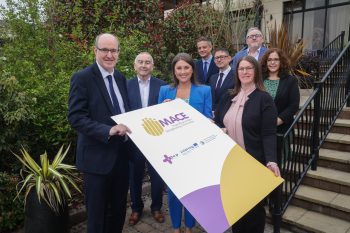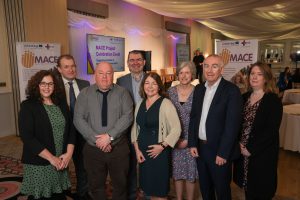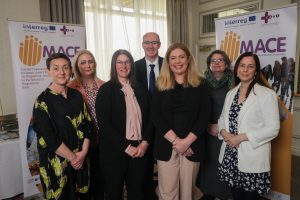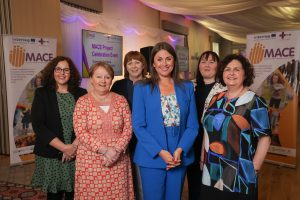May 12, 2023

At a cross border event, Co-operation & Working Together (CAWT) celebrated the impact that their MACE project has had on families, children and local communities. The event titled “Supporting Families and Strengthening Communities” was attended by key stakeholders as they celebrated the continued success of the EU funded project and recapped on some of the significant achievements along the way, in addition to hearing first hand experiences of how the project has positively helped families in need of support.



In total, over 5,400 families across the border counties of Ireland and Northern Ireland have received at least one universal, targeted or specialist support intervention as a result of CAWT’s Multiple Adverse Childhood Experience (MACE) project.
This cross-border project – which is funded by the European Union’s INTERREG VA programme and managed by the Special EU Programmes Body (SEUPB) – aimed to transform the lives of vulnerable children and families who are at most risk from adversity in their lives, by identifying, intervening, and providing necessary support. The project received EU grant funding totalling €5.01 million euro, with match-funding provided by the Departments of Health in Northern Ireland and Ireland.
Delivered in the border counties of Ireland and Northern Ireland, the MACE project was jointly developed by the Health Service Executive (Ireland), TUSLA (Ireland), Southern Health and Social Care Trust (Northern Ireland), Western Health and Social Care Trust (Northern Ireland), Public Health Agency (Northern Ireland) and the Strategic Planning and Performance Group (Northern Ireland), all of whom recognise the importance of early intervention and support for families and children in vulnerable situations.
Experiences of adversity and trauma occur in almost everyone’s life at some point. Sometimes these experiences happen in our childhood when we are more sensitive to trauma and the effect can last longer. How we learn to cope with these negative experiences can help improve future outcomes for us, the children we care for, our families and friends and the wider community. Examples of Adverse Childhood Experiences (ACEs) or negative experiences to which a child is exposed can include parental alcohol/drug abuse, domestic violence in the home, parental mental illness, bereavement within the home, disability etc.
Evidence suggests that early years and early adolescence are the optimum times for support and the development of skills to develop future resilience. Thus, the MACE project aimed to help children/families who are at risk from multiple adversities in their lives, through raising awareness about childhood trauma/adversity and providing nurturing support within our communities.
The MACE project has developed a trauma informed practice toolkit for practitioners who work with families. The toolkit complements existing professional assessment processes by providing an easy-to-use system to identify ‘risks and strengths’ and in turn ‘appropriate support interventions’ for the individual family.
In addition, the MACE project developed 5 cross border community networks and along the way supported hundreds of families whilst providing training to staff from the statutory, community and voluntary sectors in a range of areas including on how to best apply the toolkit when carrying out assessment with vulnerable families, and other training designed to build the skills of those supporting families and children.
Reflecting on the importance of the project,
Peter Toogood, Deputy Secretary for Social Services Policy Group, Department of Health Northern Ireland said:
The MACE project has demonstrated how the lives of vulnerable families who are at risk from multiple adversities can be transformed through the early identification of those adversities and the provision of nurturing support and services within their own communities.
The MACE project is an example of positive and purposeful empowerment that enables families to develop their own solutions and greater resilience by availing of the right support at the right time to address emerging vulnerabilities.
It is also an excellent example of responsive early help and support that is delivered in a person-centred ethos and in partnership with those receiving the services.
Minster Stephen Donnelly TD, Minister for Health Ireland said:
The MACE project shows the value of cross-border cooperation across a number of agencies to help our most vulnerable children and young people. We know that multiple Adverse Childhood Experiences can have significant health-related impacts on young people growing up. This EU INTERREG VA project facilitated early intervention and a family, community-based approach, thus creating a real pathway for the future for children and families. I wish to compliment all the partners involved in this very worthwhile project.
Gina McIntyre, Chief Executive of the SEUPB, said:
The creation of this cross-border network has helped to provide the right support and transform the lives of over 5,000 vulnerable families and children, most at risk from multiple adversity in their lives. This support from INTERREG VA will help nurture and improve the futures of our children and their families and provide equality of access to vital services.
The MACE project also provides practical training to staff from the statutory, community and voluntary sectors to help build skills so they can best support vulnerable families in our communities.
Tom Cassidy, Project Chair of MACE within the CAWT Partnership said:
CAWT is extremely proud to have delivered on the MACE project on behalf of SEUPB. To see how our work has positively affected so many children and families is heart-warming and inspiring to us all.
This project was designed to build cross border relations, identify those children in vulnerable positions and intervene with support initiatives whilst training staff to understand which families need support the most.
In developing the innovative purchasing frameworks, the project now provides a platform of quality programmes which can be purchased at a fixed price by health and social care professionals allowing them to provide timely interventions.
The MACE project has been a major success, having effectively developed an adversity matrix which helps the identification and assessment of families alongside a toolkit to be used by practitioners to recognise the appropriate intervention for families.
In developing 5 cross border community networks, the MACE project has helped over 5,000 families whilst training 558 staff and can be deemed a major success and something to be celebrated by all.
Kate Duggan, Chief Executive (Interim), Tusla said:
The MACE project has provided an excellent opportunity to work collectively with partner agencies from both sides of the border to improve the lives of vulnerable children and families. The success of this project highlights the importance of cross-border collaboration which has helped to transform lives, providing supports to over 5,400 families.
Tusla is committed to continuously developing our knowledge and skills as we work to enhance the lives of those we support. The MACE project has provided shared learnings, best practice and additional toolkits for our teams which will in turn help strengthen communities and ensure children and families in need are supported.
Having been launched in 2018, the project has successfully delivered on all key targets with regards to its beneficiaries, training of staff and establishment of new innovative purchasing frameworks.
In total, 200 different support interventions for vulnerable families were made available within these purchasing frameworks, providing practitioners a choice of programmes to be utilised for the families identified as needing support. Furthermore, the assessment toolkit was delivered to 558 practitioners throughout five cross border networks with over 5,400 families receiving an intervention.
-ENDS-



